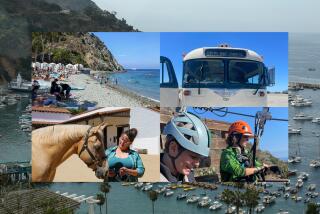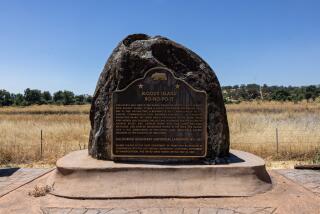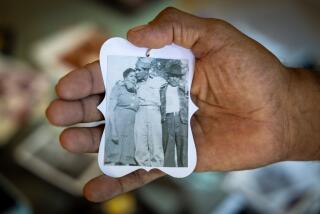Name Is the Game as Rival Avalon Societies Collide in Historical Battle
- Share via
AVALON — This city is celebrating its centennial this year, and to commemorate the event the Avalon Historical Society is selling $39.95 plates with scenic views of the island city.
But unlike historical societies in many cities, the Avalon Historical Society, established only last year, is a private corporation selling the decorative plates for profit.
That has upset the city’s traditional historical society, the nonprofit Catalina Island Museum Society, founded in 1953. Museum officials say people are confusing the two societies and are buying the plates in the false belief that they are helping the museum.
The City Council has been dragged into the fracas. Museum officials have complained that if the city accepts a centennial clock and a sculpture that the company has offered, the action will further confuse people by legitimizing the company as a historical society.
“We are not looking for any new issues to get involved in,” sighed City Manager John Longley, who has asked the city attorney to give an opinion on the matter. “We’re just trying to determine what is right for the city.”
Seeking to thwart the company, Councilman George Scott has tried to obtain exclusive rights to its name. In April, 1986, he formed a nonprofit Avalon Historical Society and registered the name with the California secretary of state’s office as an unincorporated, nonprofit association.
But the other Avalon Historical Society had been doing business under that name since January, 1986, and had filed a fictitious business name statement with the Los Angeles county clerk in February, 1986. It was not registered with the state as a corporation, however, until August, 1986, after Scott’s filing.
The law is unclear, and both societies are claiming exclusive right to the name. The issue may have to be settled in court.
Company Founder Amused
Ray Miller, a 64-year-old retired businessman who formed the commercial Avalon Historical Society, said he is more amused than upset and thinks the controversy will blow over.
“This is the Avalon syndrome at work,” Miller said chuckling. “Here in Avalon the attitude is that ‘If you were doing it yesterday, we like it. If you started doing it today, we are opposed to it. But if you keep on doing it, by tomorrow we’ll like it fine because you were doing it yesterday.’ I’m amused by all this.”
Miller, who began visiting Catalina in 1965 and moved there permanently five years ago, said he got the idea for the decorative plates when he saw similar ones being sold in Hawaii.
“Nothing like this was being done in Avalon and I thought there was a place here for it,” he said.
Variety of Products
Miller acknowledges that he took the name to add some credibility to his products, which also include a 30-minute video cassette of Catalina, clocks, music boxes and three-inch Christmas tree decorations of Catalina landmarks.
But he denies that he is trying to deceive the public.
“A historical society does not automatically refer to a group of people attempting to paint a city lamppost,” Miller said. “People are all hung up on the use of a name. These people have a proprietary attitude about history.”
Jon Hardy, president of the Museum Society’s board of trustees, said the problem is not in Miller selling his products, but rather the name of his company.
Cause of Confusion
“We have no desire to interfere with his business, nor do we question the quality of his products or the right to sell them,” said Hardy, who runs a diving service. “But the name of his business has created substantial confusion. It is not what we normally understand the meaning of a historical society to be.”
Hardy said the matter has become so confused that the Museum Society had to send a letter to its members explaining that the Avalon Historical Society was not affiliated with it.
He said the first half of 1986 was spent unsuccessfully trying to persuade Miller to change the name of his business.
Miller said no benefit was offerred him to change the name, and, in fact, the museum rejected his application for a corporate membership.
“We rejected his membership to avoid adding credibility to his business,” Hardy said.
Gifts Protested
The museum last month also asked the City Council to reject Miller’s offer of the clock and sculpture, complaining in a letter that he was “capitalizing on the prestige and good will we have built during 34 years of service to the community.” The museum asked the council to “consider the harm that the recognition implied in the acceptance of such gifts” would do to the museum.
At issue is Section 14492 of Article 5 of the state Business and Professions Code, which says that the rights to a name belong to the first organization, registered with the secretary of state, that adopts and uses it.
Miller’s attorney, Edwin B. Stegman of Los Angeles, argues that although Scott’s historical society may have been registered first, he has never used the name.
“They have had to use the name and, as I far as I am aware, they have never used it,” Stegman said. “They have not met the provision to own the name.”
Offered Name to City
Scott could not be reached for comment, but city and museum officials said they were not aware of Scott’s Avalon Historical Society having conducted any business in the city. In fact, Scott has offered the name to either the city or the Museum Society.
Meanwhile, Miller, who has sold 5,000 plates, is preparing to market a second set.
“Rather than fighting me, the museum could and should be selling my products,” Miller said. “And I would have sold them to the museum at wholesale or on consignment.”
More to Read
Sign up for The Wild
We’ll help you find the best places to hike, bike and run, as well as the perfect silent spots for meditation and yoga.
You may occasionally receive promotional content from the Los Angeles Times.






